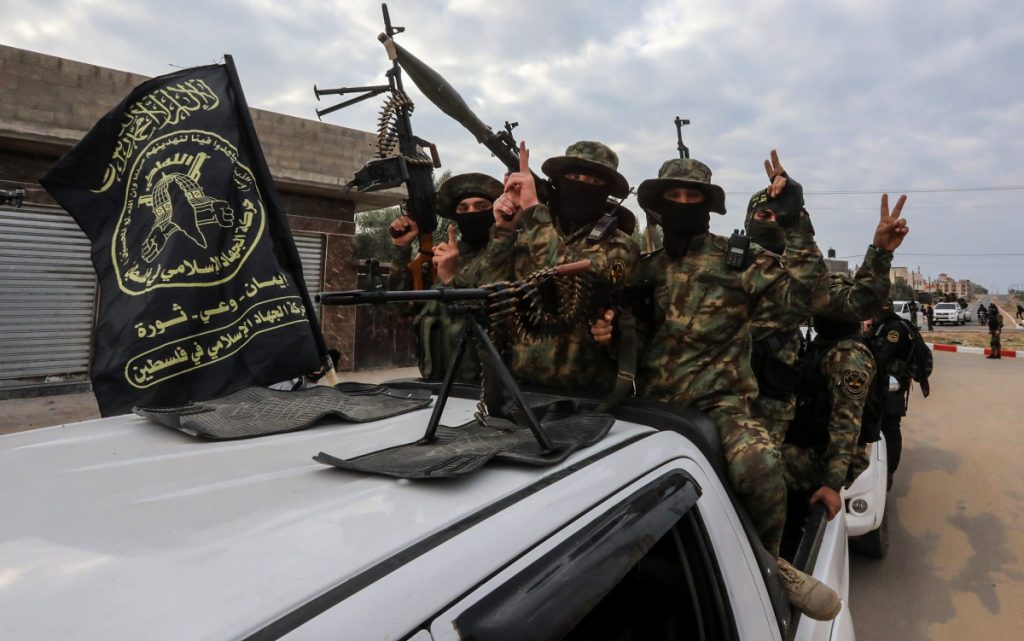IN THE MEDIA
Israel holding firm against Iranian-backed attacks
August 17, 2022 | Oved Lobel

An edited version of this article appeared in the Daily Telegraph – 17 August 2022
Earlier this month, as Palestinian Islamic Jihad (PIJ) leader Ziyad al-Nakhala toured Iran to meet his patrons, including Iranian President Ebrahim Raisi and the commander of the Islamic Revolutionary Guard Corps (IRGC) Hossein Salami, Israel conducted a substantial operation, dubbed ‘Breaking Dawn’, against the group closer to home.
Following the arrest of Bassam al-Saadi, a key PIJ leader in the West Bank, Jerusalem received intelligence of a major PIJ terror operation being prepared in Gaza. Acting preemptively, it assassinated a top military leader in Gaza, Tayseer Jabari, who was overseeing the attack plans. After PIJ fired some 1,100 rockets at Israeli cities in response, around 200 of which fell inside Gaza and caused significant Palestinian casualties, Israel hit other key PIJ leaders, workshops and weapons storage sites. By the time a ceasefire was reached under Egyptian auspices on Sunday evening, Israel claimed to have wiped out the entirety of PIJ’s senior military leadership.
PIJ is effectively an organ of Iran’s IRGC, having split from the Muslim Brotherhood in favour of the pan-Islamic ideology of then-Iranian Supreme Leader Ayatollah Ruhollah Khomeini in the 1980s. Throughout the 90s and early 2000s, it conducted a series of horrendous terrorist attacks against Israeli civilians and was unapologetic about its goal of destroying Israel, leading to its designation as a terrorist organisation by much of the Western world, including Australia and New Zealand.
While those ignorant of the region will raise questions about how Shi’ite Iran could possibly be allied to Sunni terrorists like PIJ or Hamas, the simple fact is Iran has been allying with Sunni and even non-Islamic groups since Khomeini seized power in 1979. This includes al-Qaeda and various other Sunni jihadists across the world, as well as Palestinian terrorist groups across the political and religious spectrum.
Since 1979, the Iranian regime has been hellbent on exporting its Islamic revolution with the goal of driving out the US presence from the Middle East; destabilising and ultimately conquering or co-opting America’s Arab partners and clients in the Gulf; and, most importantly, destroying Israel.
PIJ has been a key part of this strategy, one of several external manifestations of the IRGC intended to surround Israel on all sides with missile arsenals and other weaponry, from Yemen, Iraq, Syria and Lebanon, as well as the Palestinian territories themselves.
The purpose of this strategy is to move the battlefield away from Iran and closer to Israel, all the while trying to asymmetrically challenge Israel’s obvious military superiority and especially to overwhelm its advanced missile defences. The regime’s nuclear weapons program is likely intended to be a key part of this strategy, allowing Iran to wage a long war of attrition against Israel without worrying about facing retaliation on its own territory.
As PIJ official Ramez al-Halabi declared last year, “The mujahideen in Gaza and in Lebanon use Iranian weapons to strike the Zionists. We buy our weapons with Iranian money. An important part of our activity is under the supervision of Iranian experts.” The IRGC has not only been training, funding, and directly arming PIJ operatives for decades, but has also established local production capabilities in Gaza that enable the group, as well as Hamas, to manufacture cheap, IRGC-designed rockets locally. PIJ was assessed to have between 6000-8000 rockets of various types prior to ‘Breaking Dawn’.
While the prospect of a multi-front IRGC war against Israel involving thousands of rockets and missiles flying from all directions is Jerusalem’s ultimate strategic nightmare, Israel has once again demonstrated this nightmare is still a long way from reality. In both the West Bank and Gaza, Israel has largely contained PIJ, every so often mounting short operations to assassinate or arrest senior leadership.
What is notable is that in both ‘Breaking Dawn’ and its 2019 iteration, ‘Black Belt’, Hamas did not join in the fighting. If even PIJ’s co-located sister organisation, also beholden to Iran, won’t enter the fray, then neither will anyone else.
Thanks to active missile defence measures like the Iron Dome, which reportedly downed approximately 97% of the rockets heading towards populated Israeli areas, and passive defence measures like early warning notifications and bomb shelters, Israel was able to absorb PIJ’s intensive retaliation without loss of life.
Iran may be pursuing the capabilities to launch a multi-front war, but it’s clear Israel has figured out how to negate the effectiveness of the Gaza front even as its “war between wars” keeps the IRGC presence in Syria and Lebanon contained.
Thanks to the Abraham Accords, Israel would easily be able to target the Houthis in Yemen in case of an attack, either alongside or using the territory or airspace of the UAE and Saudi Arabia. Israel has also demonstrated the capability to strike Iraq and even Iran itself when it feels the need.
Iran wanted to ring Israel with proxies and missile arsenals, but it’s unclear who is actually surrounding whom. As multiple Israeli sabotage and assassination operations inside Iran have shown, Tehran’s aggressive plans are just not working.
Oved Lobel is a policy analyst at the Australia/Israel & Jewish Affairs Council (AIJAC).
Tags: Iran, IRGC, Israel, Palestinian Islamic Jihad





